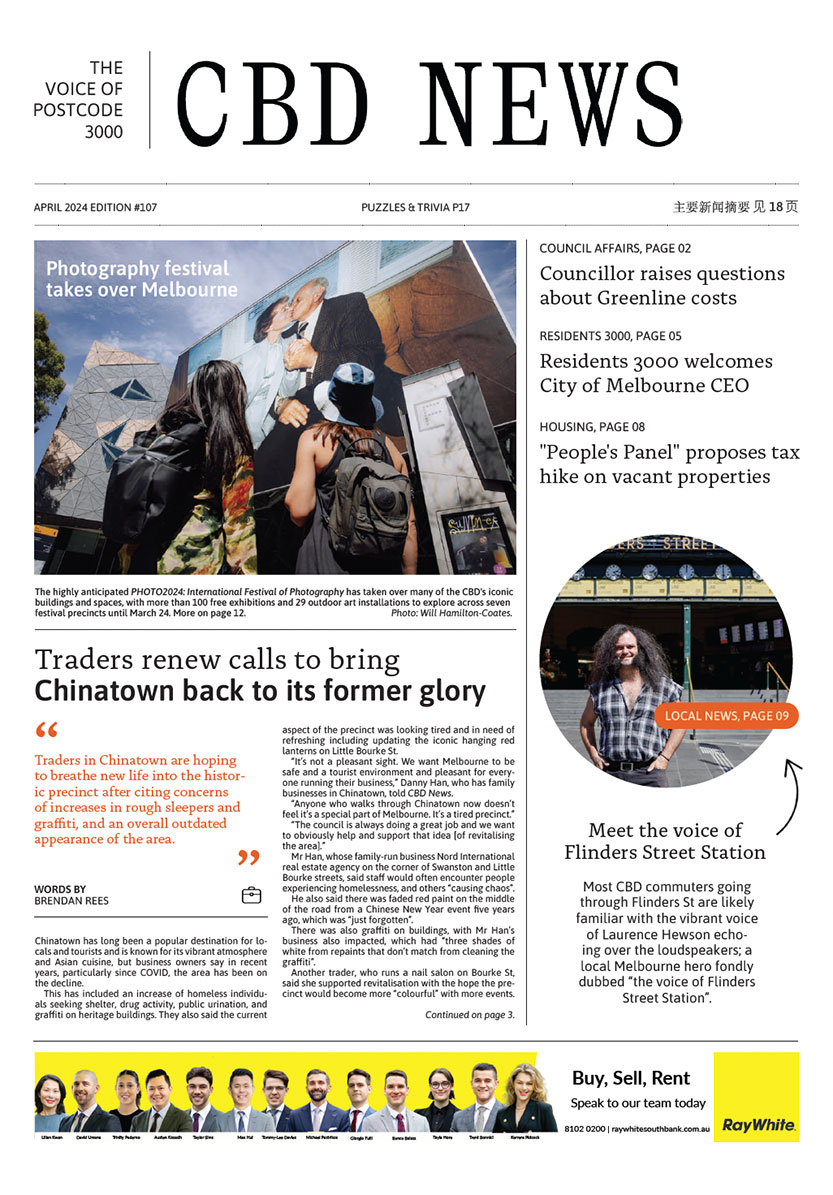Residents “shut out” from planning
By David Schout
CBD residents are largely unheard in council planning matters and deserve a greater say in the city’s direction, a leading voice on citizen juries has said.
Dr Stan Capp has proposed creating a panel of impartial residents to add a missing democratic layer in the city’s decision-making process.
He said the council’s current avenues for local input were insufficient, while the creation of a “people’s panel” for Queen Victoria Market (QVM) was “poorly structured and has had predictably disappointing outcomes”.
Dr Capp, a former CEO of Southern Health and a 19-year Exhibition St resident, completed a doctoral thesis in 2001 on public healthcare in which a key focus was on community engagement.
The study sought optimal ways of engaging the community in decision-making, a process he believed needed to occur in Melbourne.
With experience in local government, including a stint as CEO of Glen Eira City Council, Dr Capp said residents’ perspective in Melbourne was “incredibly lacking”.
In his first exposure to the decision-making process at Town Hall some years ago, he recalled having little opportunity to challenge a development before councillors ticked it off.
“I just felt something was missing in relation to giving council the benefit of a resident's view,” he said in an interview with CBD News.
His plan, which he has shared with Lord Mayor Sally Capp (no relation) and other councillors, would include a panel of impartial, unaffected CBD residents who would hear from developers, architects, planning officers and directly impacted residents before making recommendations back to councillors of its recommendations.
Dr Capp said it would be “surprising” if design compromises could not be achieved through a constructive process.
His experience in running mediated sessions between developers and residents in Glen Eira gave an “almost 100 per cent success rate” of effective compromise.
He said it was important a panel – which would include a mix of people based on age, gender, background and orientation – was impartial, unlike the City of Melbourne’s latest attempt.
“The constituency at the QVM (people’s panel) was 40 folk who all have an interest, but the residents’ panel idea is that the people don’t have a particular direct interest in what’s happening, but they’re residents of Melbourne,” Dr Capp detailed.
“As soon as you get an interest, you have this conflict of being objective and subjective. Like ‘oh, my view’s going to go, therefore we can’t have the building’. The thesis behind this is to get people who are committed to good planning and can represent a resident’s view. You get this group together that are unbiased, if you will. It’s like a jury – that’s why they’re called citizens’ juries.”
Currently, the City of Melbourne can approve developments of 25,000 sqm or less, while the state government adjudicates planning matters above that limit.
However, Dr Capp said the planning minister received council recommendations on matters that exceeded their jurisdiction.This would ensure – should a panel be established – residents’ views were always heard.
He said the City of Melbourne’s current decision-making process “shut out” residents from planning matters.
“At the moment we have advice from council officers, we have councillors’ views, but we have no vehicle for residents’ views to be part of that process.”
Currently, residents can voice feedback via the Participate Melbourne webpage, or an objection in writing to be considered by the planning officer.
In almost all circumstances, councillors adopt officers’ recommendations on an issue. In fact, a former City of Melbourne councillor put to Dr Capp that 98 per cent of council officers’ reports were endorsed by councillors.
He said that while officers played an important role in ensuring compliance with regulation, decision-making needed wider input.
In 2015, the council convened 43 randomly selected Melburnians to make decisions on its 10-year financial plans.
Many of the recommendations from the citizens’ jury were adopted by the council, and the exercise was widely hailed a success.
“The Melbourne People’s Panel shows the public is very smart, if given the time and information necessary to work through an issue,” current councillor Nicholas Reece wrote in The Age at the time.
“That a group of 43 randomly selected Melburnians meeting over six weekends developed sound policy that is now being implemented is a profound result for anyone despairing at the state of our democracy. And it invites the exciting question, what’s next?” As it turns out, not much.
The Lord Mayor has proposed the idea for 12 months but as yet, no draft plans have emerged.
In September last year she told CBD group Residents 3000 that the concept of a residents’ panel was progressing.
“It would be a way in which we could have residents more involved in planning decisions, but really, more pre-application discussions with the council and, hopefully, also with developers if we can get them involved,” Cr Capp said.
Planning portfolio chair Cr Nicolas Reece also said in March to “watch this space” on citizens’ panels.
But while a commitment remains to explore the effectiveness of deliberative democracy, the council is yet to reveal any concrete details.
“The City of Melbourne is continuing to progress what a residents’ panel might look like, what its terms of reference might be, and the sorts of issues which that group would consider,” a council spokesperson said.
Dr Capp stressed that his proposal was not simply a way to prevent development, but rather to increase democracy.
He acknowledged that forming citizens’ juries was by no means an easy exercise but said its role could shape the future of the city.
“I would deny anybody who says it doesn’t provide us with another residents’ perspective. And it’s the residents’ perspectives that I think is incredibly lacking in this council.”

“Swanston Triangle” to undergo green renewal






 Download the Latest Edition
Download the Latest Edition